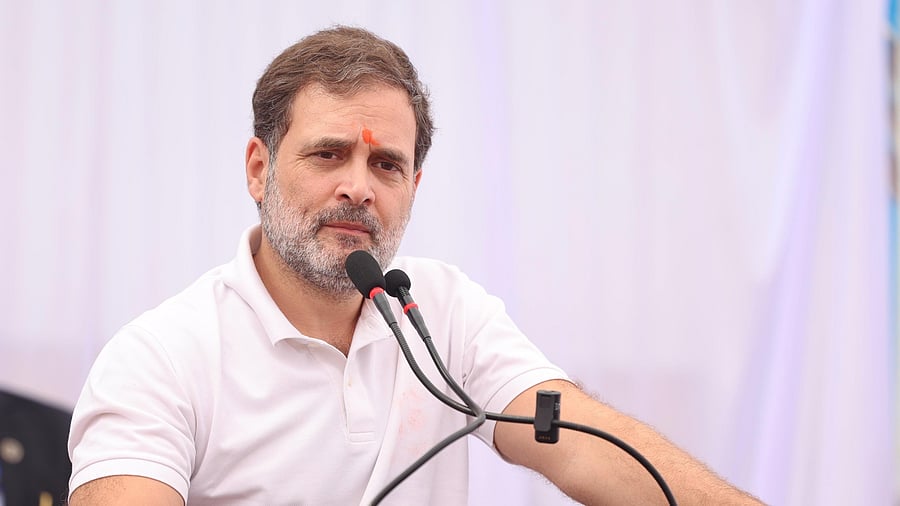
Rahul Gandhi
Credit: X/@INCIndia
The Gujarat Congress is gearing up to host its All India Congress Committee (AICC) session on April 8 and 9.
Leader of the opposition in Lok Sabha and Congress MP from Rai Bareli, Rahul Gandhi, is visiting the state exactly a month before the scheduled meeting—a move seen as the party’s well-planned strategic decision.
His visit is also being interpreted as a shift by the party’s central leadership, which has long been criticised for “ignoring” the state, which is “central to the rise and might of the ruling BJP”.
The Congress’ central leadership would be descending on Gujarat for such a gathering after 64 years; the last AICC session in the state was held in 1961 in Bhavnagar, Saurashtra.
Political observers believe this event is significant for a party that has been out of power for more than three decades, as it seeks to devise strategies to counter the BJP and mount a stronger challenge.
This also shows that the party is addressing the local leaders’ complaints that the central leadership only takes interest in the state during the time of elections.
However, reviving the Congress in Gujarat is easier said than done. In the recently concluded local body elections, the opposition party continued to suffer setbacks.
The BJP won 1,608 seats out of a total of 2,171 and secured victory in 62 out of the 68 municipalities. Congress managed to retain only Salaya in the Devbhumi Dwarka district, primarily banking on Muslim votes, but lost 12 municipalities it had previously won.
Adding to the Congress’ nightmare is the Aam Aadmi Party, which emerged as the second largest party in at least five municipalities. AAP had contested 570 out of 2,171 seats and won 36.
The trend was a confirmation of the trend that led to the routing of Congress in the 2022 Assembly election when BJP won a record 156 seats out of 182 and Congress was restricted to 17.
AAP was placed second in as many as 30 seats that might otherwise have gone to Congress.
Last July, after a violent clash between BJP and Congress workers in Ahmedabad, Rahul Gandhi visited the party headquarters, buoyed by the Congress’ performance in the Lok Sabha elections.
He assured the party workers that they could defeat the BJP, just as they had in Ayodhya. Less than a year later, his return to Gujarat ahead of the scheduled AICC session signals the party’s intent to revive itself in the state. However, with deep factionalism still unresolved, the path forward remains unclear.
Choosing Gujarat as the venue for the AICC session is seen as a strategic move to instill confidence among the party workers, who have suffered not only electoral losses but also a mass exodus of leaders to the BJP over the past decade.
On Monday, former MLA and spokesperson Manhar Patel released a list of 75 Congress leaders—many of them veterans—who left the party in the past two decades, mostly to join the BJP.
Many defectors have blamed the local Congress leadership for their departure. Patel has called for an inquiry into these allegations against the local leaders and publicly urged the party leaders to set up an inquiry panel and take disciplinary action against those responsible.
This again underscores the deep division within the Gujarat Congress, where internal dissent frequently resurfaces whenever there is talk of revival.
“Rahul Gandhi seems serious, but what to do with the local Congress as a unit? It is a divided house. I feel that there will be more defections when Rahul Gandhi comes for the AICC session. It is quite possible, and it will be embarrassing for the party.
Seventy-five Congress leaders have left the party over the past two decades and joined the BJP. There are many more ready to cross over. Unless you get rid of this, no revival will take place,” said political observer and former editor Hari Desai in an interview with DH.
Despite its decline and being out of power for long, Congress still commands a definite vote share in Gujarat. In 2017, it won about 81 seats. “The party now has only 12 MLAs (five of them resigned and joined the BJP since the 2022 election). There is something really wrong with the party. Unless they identify these moles in the party and expel them, any talk of revival is useless,” Desai added.
The AICC session is expected to mark the beginning of Congress’ preparation for the 2027 assembly elections in Gujarat, a state central to the BJP’s rise and home to both Prime Minister Narendra Modi and Union Home Minister Amit Shah.
“Nothing will work for the Congress in this state unless they keep their flock together and fight like militant groups. They must look at the number of times the prime minister visits his home state. Similarly, central Congress leaders can take a clue from how Union Home Minister Amit Shah keeps visiting the state almost every fortnight and engages with the masses. Unless Congress sustains its campaigns, builds a team from the young generation who expose BJP, takes head-on the polarisation, among other issues, nothing will work for them,” said an academician who requested anonymity.